Betriebliche Dynamiken und Beschäftigungsergebnisse
Firmengründungen und -schließungen sind in einer Marktwirtschaft für die Reallokation von Ressourcen, strukturellen Wandel und damit für die wirtschaftliche Entwicklung von zentraler Bedeutung und spielen vor allem im Hinblick auf die wirtschaftliche Transformation Ostdeutschlands eine zentrale Rolle. Gleichzeitig können die mit dem Strukturwandel verbundenen Arbeitsplatzverluste dramatische Folgen für betroffene Arbeitnehmer haben, wie z.B. Arbeitslosigkeit, Einkommensverluste oder eine geringere Arbeitsplatzqualität. Diese Forschungsgruppe untersucht mithilfe mikroökonometrischer Methoden Gründungen, Wachstumsprozesse und das Scheitern von Unternehmen, die Anzahl und Qualität der von Neugründungen geschaffenen Arbeitsplätze und die Folgen von Firmenschließungen für betroffene Arbeitnehmer und Arbeitnehmerinnen, vor allem in Bezug auf Arbeitsmarktergebnisse wie Beschäftigung und Löhne.
Forschungscluster
Produktivität und InstitutionenIhr Kontakt

- Abteilung Strukturwandel und Produktivität
PROJEKTE
01.2020 ‐ 06.2024
Europas populistische Parteien im Aufwind: die dunkle Seite von Globalisierung und technologischem Wandel?
VolkswagenStiftung
Die Globalisierung hat zwar allgemein den Wohlstand gesteigert, aber in vielen Regionen Europas auch zu Arbeitslosigkeit, Lohnungleichheit, Abwanderung und Überalterung geführt. Das Projekt untersucht, ob diese ökonomischen Lasten zu Wählerstimmen für populistische Parteien führen.
01.2019 ‐ 06.2022
MICROPROD („Raising EU Productivity: Lessons from Improved Micro Data“)
Europäische Kommission
Ziel von MICROPROD ist es, zu einem besseren Verständnis der Herausforderungen beizutragen, die die vierte industrielle Revolution in Europa mit sich bringt. Verliert das Produktivitätswachstum im Kontext von Globalisierung und Digitalisierung an Schwung, und wenn ja, warum?
This project has received funding from the European Union’s Horizon 2020 research and innovation programme under grant agreement No 764810.
07.2018 ‐ 12.2020
Firmenlohndifferentiale in unvollkommenen Arbeitsmärkten: Die Rolle von Marktmacht und industriellen Beziehungen in der Aufteilung der Beschäftigungsrenten zwischen Arbeitnehmern und Arbeitgebern
Deutsche Forschungsgemeinschaft (DFG)
Ziel dieses Projekts ist es, die Aufteilung der Beschäftigungsrenten auf unvollkommenen Arbeitsmärkten und den Einfluss von Arbeitsmarktinstitutionen wie Tarifbindung und betrieblicher Mitbestimmung auf Firmenlohndifferentiale zu untersuchen. Über die Grundlagenforschung hinaus hat das Projekt damit Potential, wichtige wirtschaftspolitische Debatten zur institutionellen Ausgestaltung des Lohnfindungsprozesses zu informieren.
02.2019 ‐ 09.2019
Auswertung des IAB-Betriebspanels 2018 und Erstellung eines Ergebnisberichts für West- und Ostdeutschland
04.2016 ‐ 03.2019
Lohn- und Beschäftigungseffekte von Insolvenzen
Deutsche Forschungsgemeinschaft (DFG)
Ziel des Projekts ist es, erstmals den Prozess und die Folgen des Scheiterns von Unternehmen ausführlich zu analysieren. Insbesondere ist es im Rahmen dieses Projekts erstmals möglich, die Folgen kleinbetrieblicher Insolvenzen zu erforschen, was vor allem deshalb relevant ist, weil Arbeitnehmer in Betrieben mit weniger als zehn Beschäftigten etwa viermal so häufig von Insolvenzen betroffen sind wie Arbeitnehmer in Großbetrieben.
01.2018 ‐ 12.2018
Auswertung des IAB-Betriebspanels 2017 und Erstellung eines Ergebnisberichts für West- und Ostdeutschland
01.2017 ‐ 09.2017
Auswertung des IAB-Betriebspanels 2016 und Erstellung eines Ergebnisberichts für West- und Ostdeutschland
Referierte Publikationen

Do Digital Information Technologies Help Unemployed Job Seekers Find a Job? Evidence from the Broadband Internet Expansion in Germany
in: European Economic Review, February 2021
Abstract
This paper studies effects of the introduction of a new digital mass medium on reemployment of unemployed job seekers. We combine data on broadband internet availability at the local level with German individual register data. We address endogeneity by exploiting technological peculiarities that affected the roll-out of broadband internet. Results show that broadband internet improves reemployment rates after the first months in unemployment for males. Complementary analyses with survey data suggest that internet access mainly changes male job seekers’ search behavior by increasing online search and the number of job applications.
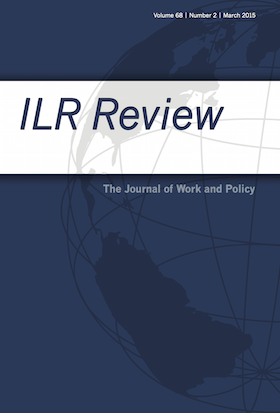
Firm Wage Premia, Industrial Relations, and Rent Sharing in Germany
in: ILR Review, Nr. 5, 2020
Abstract
The authors use three distinct methods to investigate the influence of industrial relations on firm wage premia in Germany. First, ordinary least squares (OLS) regressions for the firm effects from a two-way fixed-effects decomposition of workers’ wages reveal that average premia are larger in firms bound by collective agreements and in firms with a works council, holding constant firm performance. Next, recentered influence function (RIF) regressions show that premia are less dispersed among covered firms but more dispersed among firms with a works council. Finally, in an Oaxaca–Blinder decomposition, the authors find that decreasing bargaining coverage is the only factor they consider that contributes to the marked rise in premia dispersion over time.
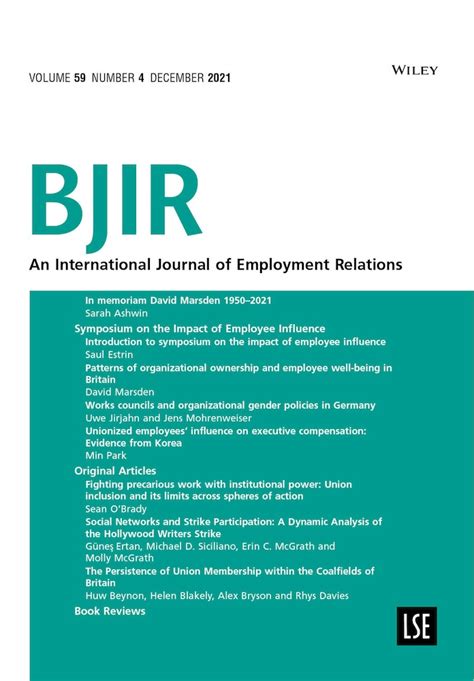
Birds, Birds, Birds: Co-worker Similarity, Workplace Diversity and Job Switches
in: British Journal of Industrial Relations, Nr. 3, 2020
Abstract
We investigate how the demographic composition of the workforce along the sex, nationality, education, age and tenure dimensions affects job switches. Fitting duration models for workers’ job‐to‐job turnover rate that control for workplace fixed effects in a representative sample of large manufacturing plants in Germany during 1975–2016, we find that larger co‐worker similarity in all five dimensions substantially depresses job‐to‐job moves, whereas workplace diversity is of limited importance. In line with conventional wisdom, which has that birds of a feather flock together, our interpretation of the results is that workers prefer having co‐workers of their kind and place less value on diverse workplaces.
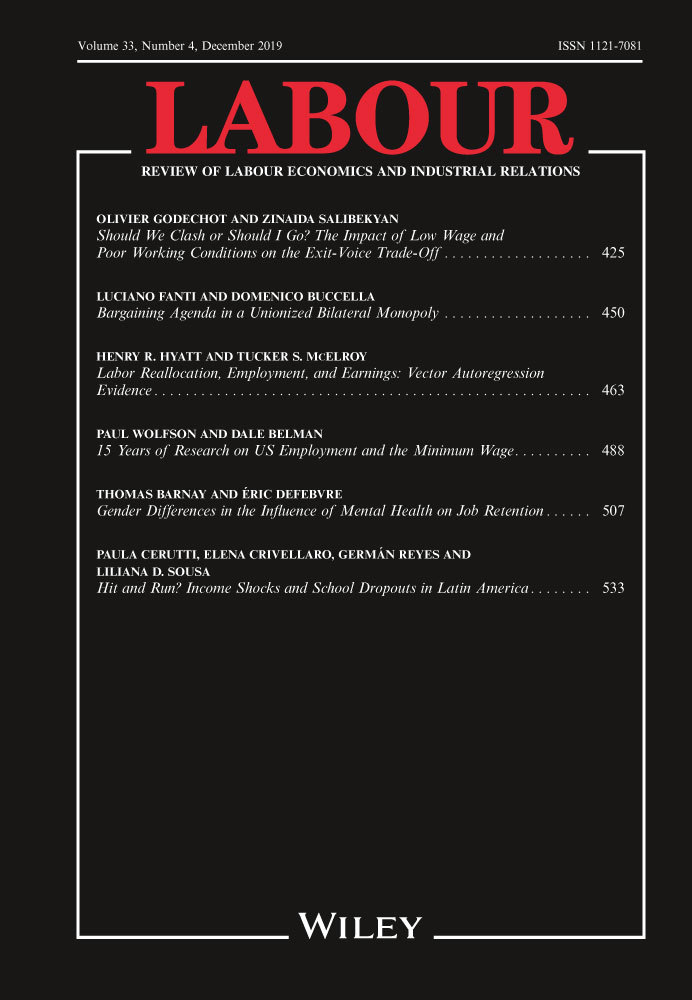
Who Buffers Income Losses after Job Displacement? The Role of Alternative Income Sources, the Family, and the State
in: LABOUR: Review of Labour Economics and Industrial Relations, Nr. 3, 2020
Abstract
Using survey data from the German Socio‐Economic Panel (SOEP), this paper analyses the extent to which alternative income sources, reactions within the household context, and redistribution by the state attenuate earnings losses after job displacement. Applying propensity score matching and fixed effects estimations, we find that income from self‐employment reduces the earnings gap only slightly and severance payments buffer losses in the short run. On the household level, we find little evidence for an added worker effect whereas redistribution by the state within the tax and transfer system mitigates income losses substantially.

Why Is there Resistance to Works Councils In Germany? An Economic Perspective
in: Economic and Industrial Democracy, Nr. 3, 2020
Abstract
<p>Recent empirical research generally finds evidence of positive economic effects for works councils, for example with regard to productivity and – with some limitations – to profits. This makes it necessary to explain why employers’ associations have reservations about works councils. On the basis of an in-depth literature analysis, this article shows that beyond the generally positive findings, there are important heterogeneities in the impact of works councils. The authors argue that those groups of employers that tend to benefit little from employee participation in terms of productivity and profits may well be important enough to shape the agenda of their employers’ organization and have even gained in importance within their organizations in recent years. The authors also discuss the role of deviations from profit-maximizing behavior like risk aversion, short-term profit-maximization and other non-pecuniary motives, as possible reasons for employer resistance.</p>
Arbeitspapiere
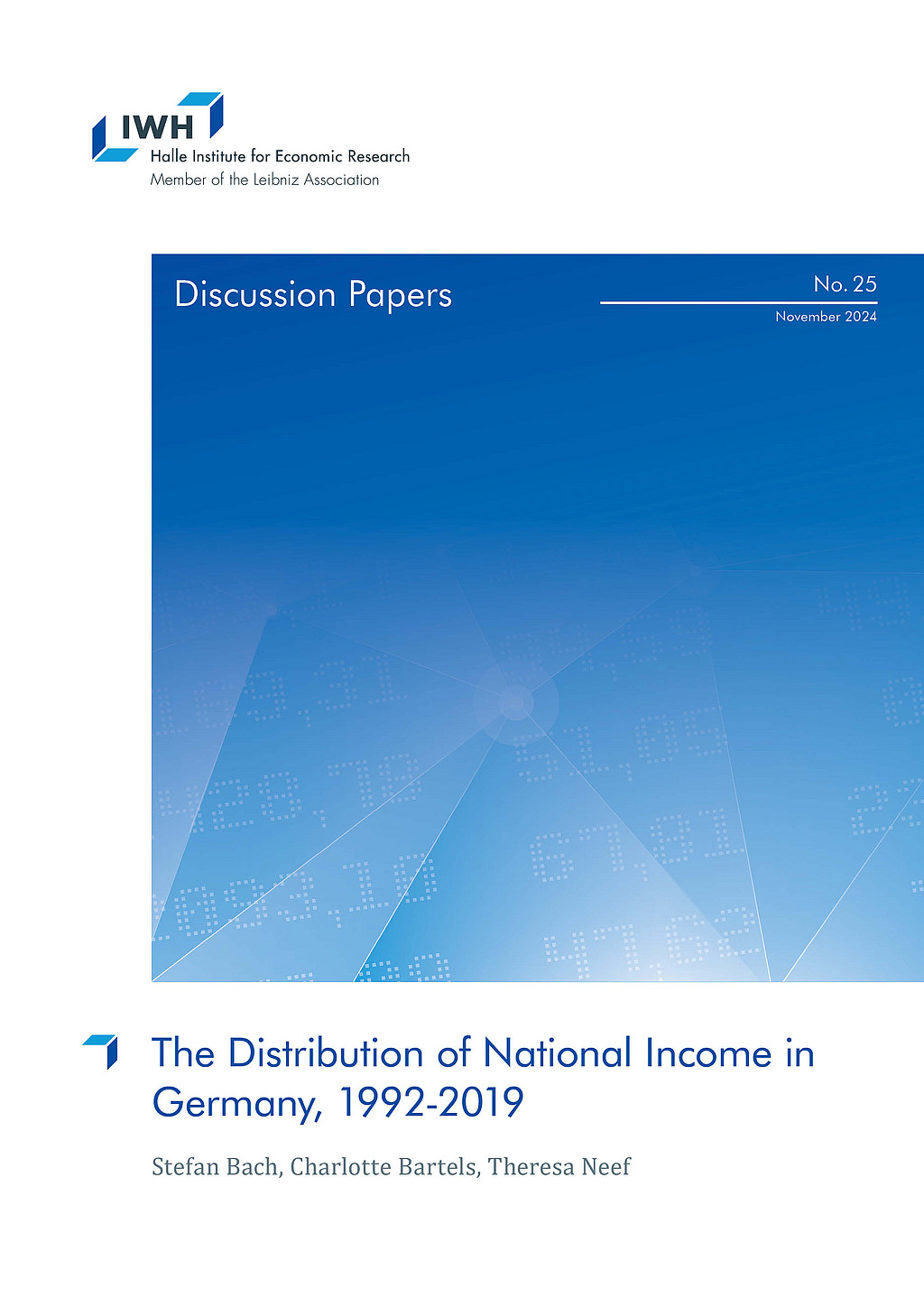
The Distribution of National Income in Germany, 1992-2019
in: IWH Discussion Papers, Nr. 25, 2024
Abstract
<p>This paper analyzes the distribution and composition of pre-tax national income in Germany since 1992, combining personal income tax returns, household survey data, and national accounts. Inequality rose from the 1990s to the late 2000s due to falling labor incomes among the bottom 50% and rising incomes in the top 10%. This trend reversed after 2007 as labor incomes across the bottom 90% increased. The top 1% income share, dominated by business income, remained relatively stable between 1992 and 2019. A large share of Germany’s top 1% earners are non-corporate business owners in labor-intensive professions. At least half of the business owners in P99-99.9 and a quarter in the top 0.1% operate firms in professional services – a pattern mirroring the United States. From 1992 to 2019, Germany’s top 0.1% income concentration exceeded France’s and matched U.S. levels until the late 2000s.</p>
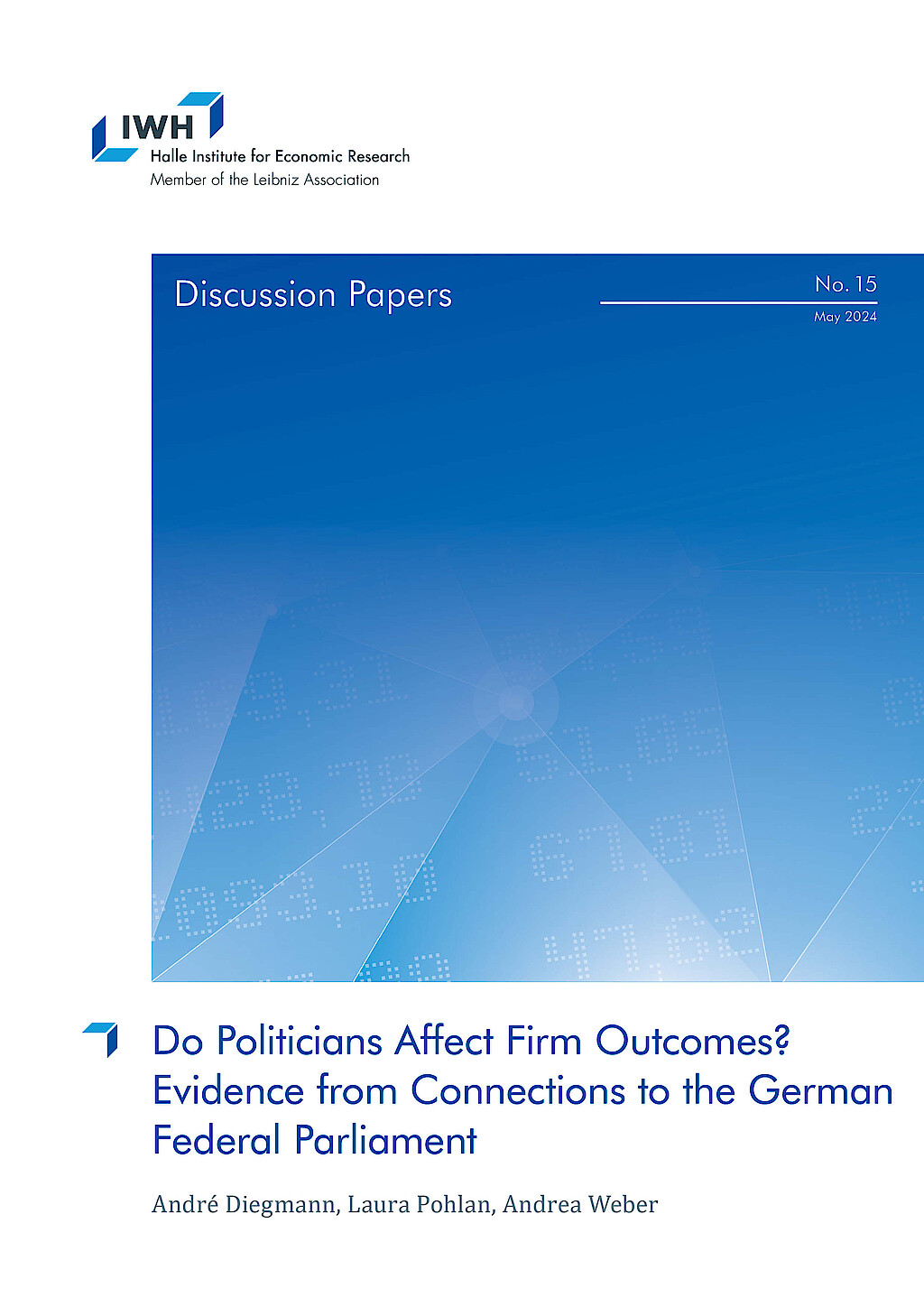
Do Politicians Affect Firm Outcomes? Evidence from Connections to the German Federal Parliament
in: IWH Discussion Papers, Nr. 15, 2024
Abstract
<p>We study how connections to German federal parliamentarians affect firm dynamics by constructing a novel dataset linking politicians and election candidates to the universe of firms. To identify the causal effect of access to political power, we exploit (i) new appointments to the company leadership team and (ii) discontinuities around the marginal seat of party election lists. Our results reveal that connections lead to reductions in firm exits, gradual increases in employment growth without improvements in productivity. Adding information on credit ratings, subsidies and procurement contracts allows us to distinguish between mechanisms driving the effects over the politician’s career. </p>
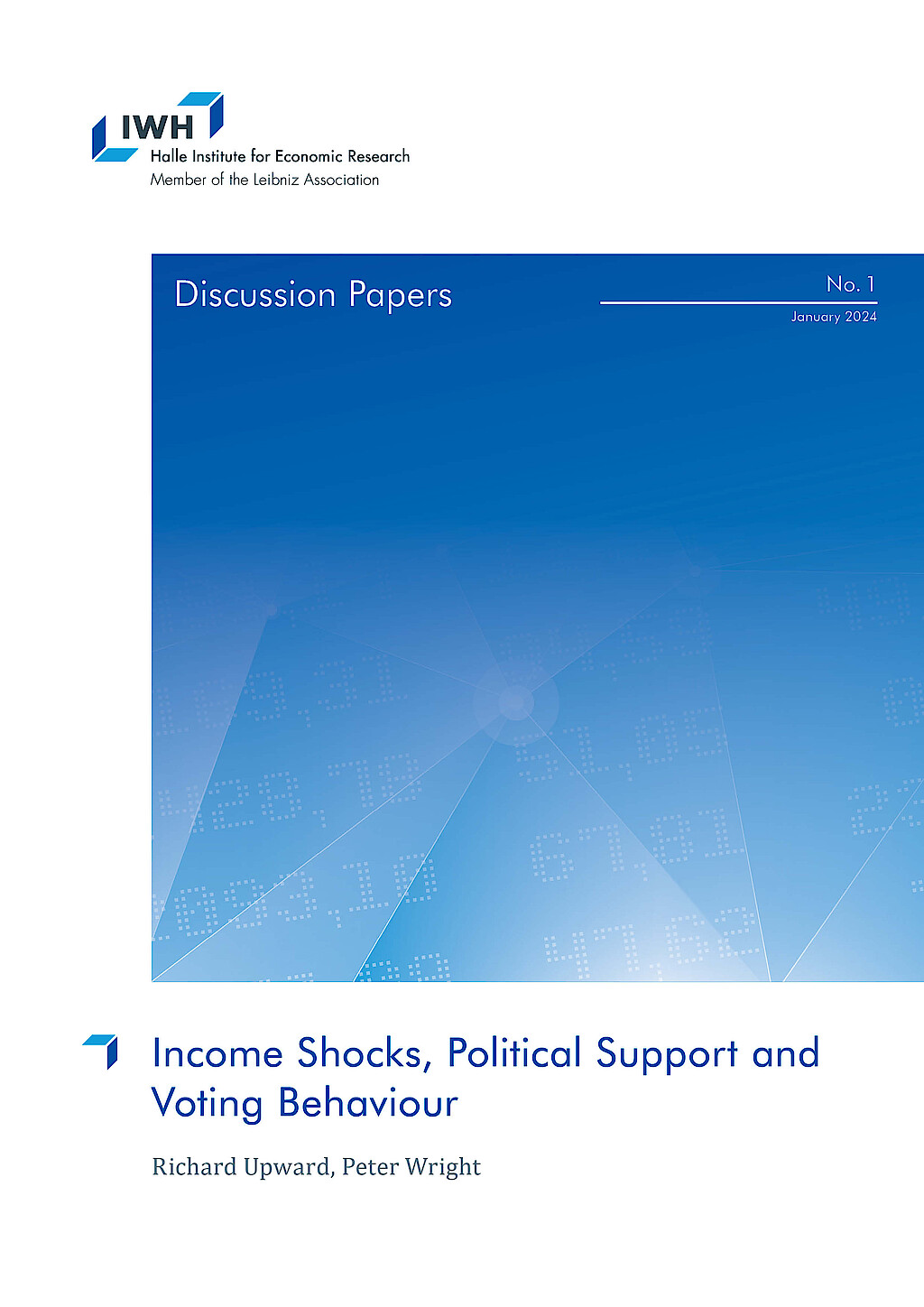
Income Shocks, Political Support and Voting Behaviour
in: IWH Discussion Papers, Nr. 1, 2024
Abstract
We provide new evidence on the effects of economic shocks on political support, voting behaviour and political opinions over the last 25 years. We exploit a sudden, large and long-lasting shock in the form of job loss and trace out its impact on individual political outcomes for up to 10 years after the event. The availability of detailed information on households before and after the job loss event allows us to reweight a comparison group to closely mimic the job losers in terms of their observable characteristics, pre-existing political support and voting behaviour. We find consistent, long-lasting but quantitatively small effects on support and votes for the incumbent party, and short-lived effects on political engagement. We find limited impact on the support for fringe or populist parties. In the context of Brexit, opposition to the EU was much higher amongst those who lost their jobs, but this was largely due to pre-existing differences which were not exacerbated by the job loss event itself.
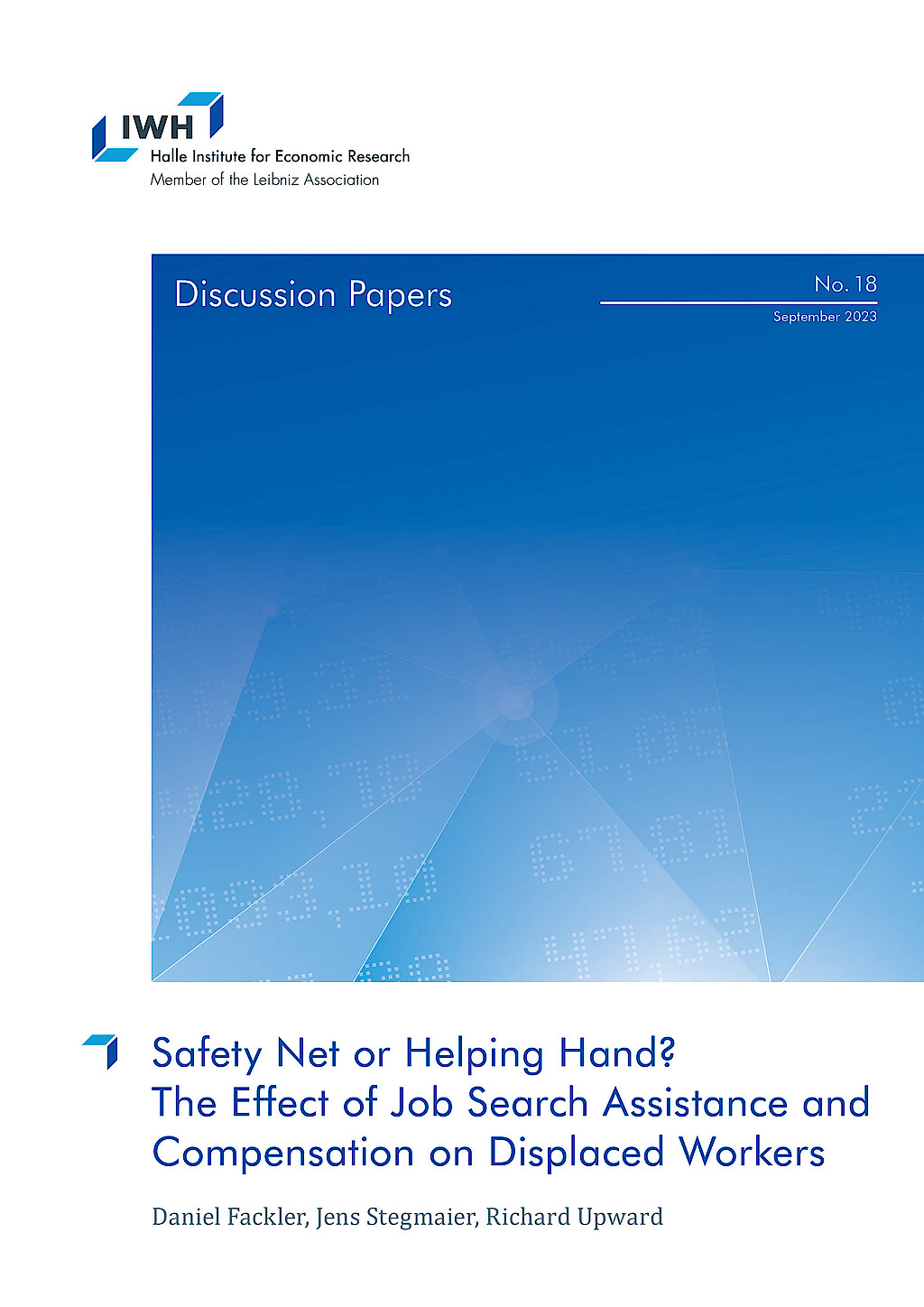
Safety Net or Helping Hand? The Effect of Job Search Assistance and Compensation on Displaced Workers
in: IWH Discussion Papers, Nr. 18, 2023
Abstract
We provide the first systematic evidence on the effectiveness of a contested policy in Germany to help displaced workers. So-called “transfer companies” (<i>Transfergesellschaften</i>) employ displaced workers for a fixed period, during which time workers are provided with job-search assistance and are paid a wage which is a substantial fraction of their pre-displacement wage. Using rich and accurate data on workers’ employment patterns before and after displacement, we compare the earnings and employment outcomes of displaced workers who entered transfer companies with those that did not. Workers can choose whether or not to accept a position in a transfer company, and therefore we use the availability of a transfer company at the establishment level as an IV in a model of one-sided compliance. Using an event study, we find that workers who enter a transfer company have significantly worse post-displacement outcomes, but we show that this is likely to be the result of negative selection: workers who lack good outside opportunities are more likely to choose to enter the transfer company. In contrast, ITT and IV estimates indicate that the use of a transfer company has a positive and significant effect on employment rates five years after job loss, but no significant effect on earnings. In addition, the transfer company provides significant additional compensation to displaced workers in the first 12 months after job loss.
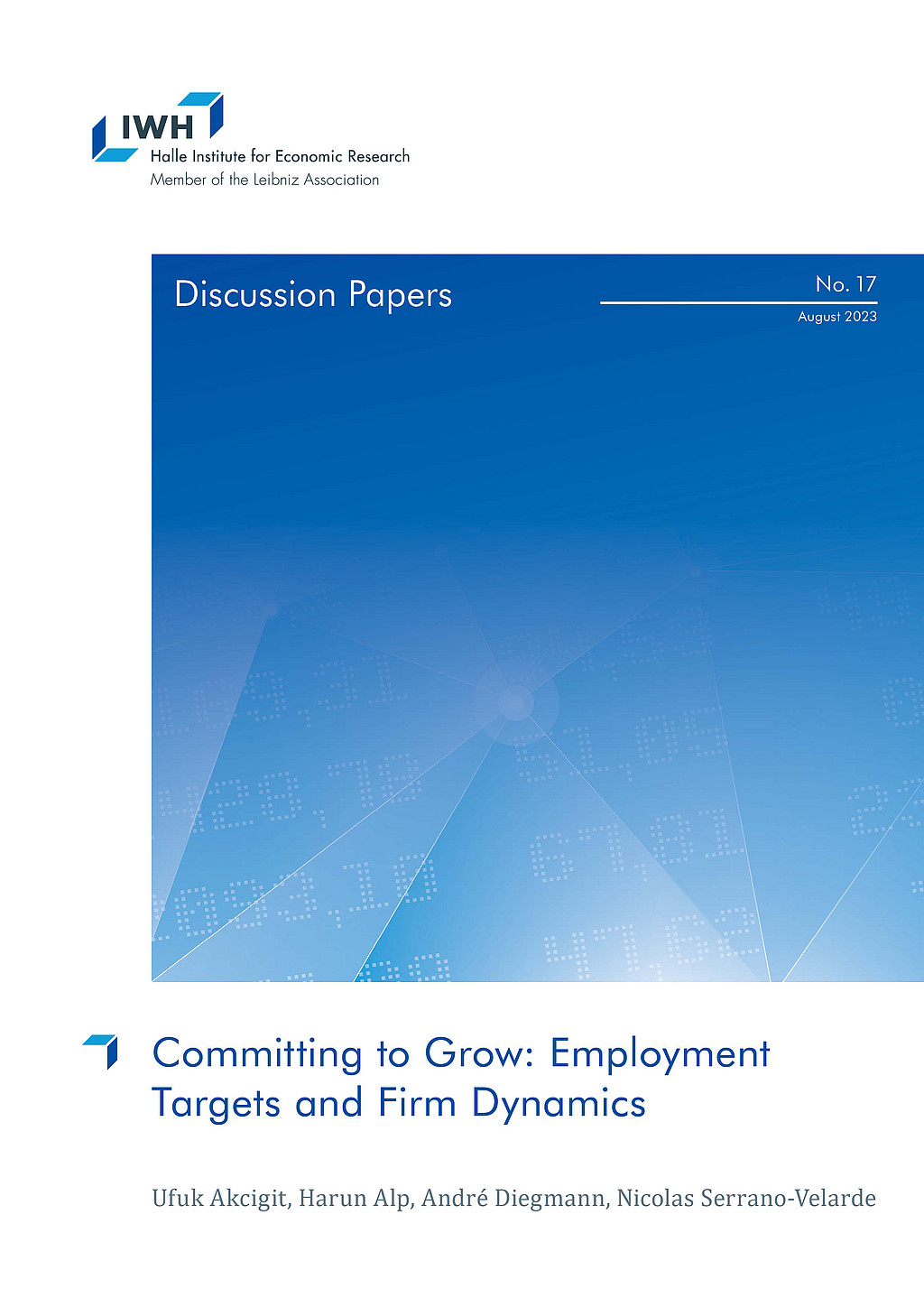
Committing to Grow: Employment Targets and Firm Dynamics
in: IWH Discussion Papers, Nr. 17, 2023
Abstract
<p>We examine effects of government-imposed employment targets on firm behavior. Theoretically, such policies create “polarization," causing low-productivity firms to exit the market while others temporarily distort their employment upward. Dynamically, firms are incentivized to improve productivity to meet targets. Using novel data from East German firms post-privatization, we find that firms with binding employment targets experienced 25% points higher annual employment growth, a 1.1% points higher annual exit probability, and 10% points higher annual productivity growth over the target period. Structural estimates reveal substantial misallocation of labor across firms and that subsidizing productivity growth would yield twice the long term increases in employment.</p>
















